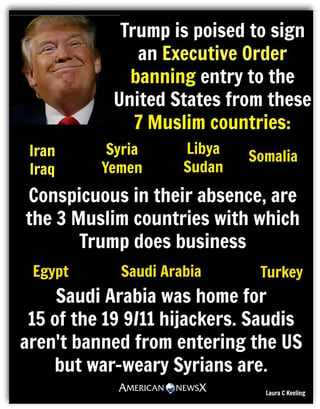Yes the facts are accurate, but the implication of causation is questionable.
President Trump did sign an executive order banning the citizens of Iran, Syria, Libya, Iraq, Yemen, Sudan, Somalia from entering the US for 90 days.
Here is a CNN article that gives the details.
It's also true that Egypt, Saudi Arabia and Turkey are not on the list.
The full text of the executive order can be seen here.
Since Trump has not released his taxes, it's hard to know exactly what his financial dealings are, but it does appear he has some financial interests in those 3 countries. For more details read this article by the New York Daily News.
From the article:
In Turkey:
Trump also currently licenses his name to two luxury towers in the Turkish metropolis of Istanbul. He received as much as $5 million from the deals last year, according to his latest financial disclosures. Furthermore, since the election, Trump’s development partner, Dogan Sirketler Grubu Holding, has seen its shares surge by nearly 11%.
In Egypt:
His [Trump's] latest Federal Election Commission filing lists two companies in the country, Trump Marks Egypt and Trump Marks Egypt LLC, both of which are most likely connected to a development venture.
In Saudi Arabia:
Trump registered eight companies tied to hotel interests in the country shortly after launching his campaign in August 2015, according to The Washington Post. The companies were registered under such names as THC Jeddah Hotel and DT Jeddah Technical Services...
Additional info on the SA companies from the WP:
Their names followed a pattern set by Trump companies connected to hotel deals in foreign cities: in this case, Jiddah, the second-biggest city in Saudi Arabia.
Four of those companies, in which Trump was named president or
director, remained active at the time of Trump’s May financial filing.
The disclosures do not provide more detail for the companies, and
Trump representatives did not respond to requests for comment.
But we can't infer causation, as we have no way of knowing why he picked some countries but not others, without him stating the reason. That being in mind, it's important to mention that the list of 7 countries was originally drafted by the Obama administration:
In February 2016, the Obama administration added Libya, Somali and Yemen to the list of countries one could not have visited — but allowed dual citizens of those countries who had not traveled there access to the Visa Waiver Program. Dual citizens of Syria, Sudan, Iraq and Iran are still ineligible, however.
So, in a nutshell, Obama restricted visa waivers for those seven Muslim-majority countries — Iran, Iraq, Syria, Sudan, Somalia, Libya and Yemen — and now, Trump is looking to bar immigration and visitors from the same list of countries.

